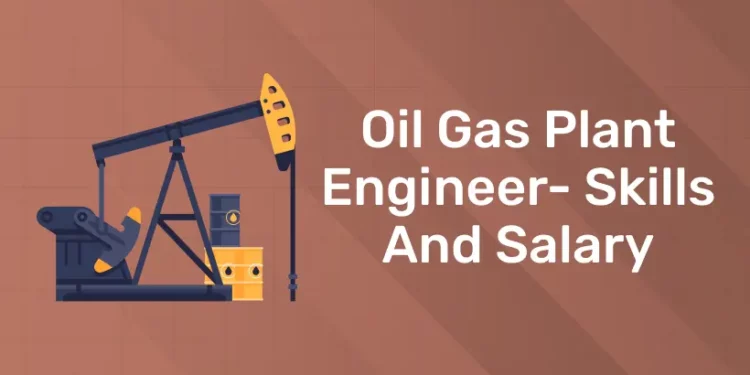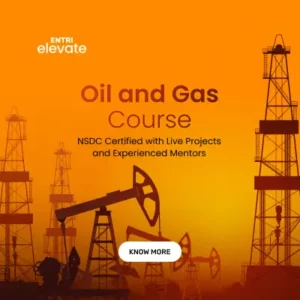Table of Contents
An authority in overseeing the design, development, and maintenance of facilities involved in the extraction, processing, and distribution of oil and gas is referred to as an oil and gas plant engineer. The efficient, safe, and environmentally conscious operation of oil and gas facilities, including petrochemical plants, refineries, and natural gas processing facilities, is primarily the responsibility of these engineers. In this article we are discussing about the skills and salaries of oil and gas plant engineers.
Get Certified! Get Confident! Join our Oil and Gas Course!
Roles and Responsibilities Of Oil Gas Plant Engineer
- Creating detailed designs and blueprints for new plants or remodeling existing ones.
- Techniques for extracting, separating, and refining gas and oil through drilling and refinement.
- Selecting appropriate equipment and supplies that meet functional and safety specifications.
- Control system deployment and management enable the monitoring of plant performance and safety.
- Plan and do routine maintenance to ensure continued operation and prevent faults.
- Land resolving issues with industrial machinery and processes.
- Project budgets and schedules are controlled to ensure that projects are completed on time and within budget.
- Distributing resources wisely in order to complete project requirements.
- Communicating with many parties, including contractors, management, and regulatory bodies.
- Always looking for ways to reduce costs and improve the effectiveness of processes.
- Maintaining current technological advancements and incorporating them into industrial operations.
- Implementing effective methods to lessen the impact on the environment and encourage sustainability.
- Ensuring that all activities adhere to international, national, and local environmental and safety requirements.
- Recognizing such risks and putting precautions in place to lessen them.
- Creating and organizing strategies for emergency responses in case of emergencies
1: What is the primary purpose of a refinery in the oil and gas industry?
Skills Required For Oil And Gas Plant Engineer
Technical skills
- Good background in petroleum, mechanical, or chemical engineering.
- Familiarity in modeling, optimizing, and designing processes.
- A working knowledge of plant machinery, including pumps, compressors, and turbines.
Software skills
- Ability to create plant layouts using AutoCAD, SolidWorks, or a comparable program.
- Familiarity with programs such as CHEMCAD, Aspen Plus, or Aspen HYSYS.
- The proficiency to operate software such as MATLAB, Excel, or industry-specific tools.
Communication skills
- Creating technical documentation and reports with proficiency.
- To collaborate with other engineers, technicians, and management efficiently, one needs strong communication and cooperation abilities.
Project Management skills
- Abilities in scheduling, resource management, and project planning.
- Cost management is the capacity to control expenses and make savings without sacrificing quality or safety.
Problem Solving skills
- The capacity to identify difficult issues and create workable solutions.
- Competent at identifying and resolving problems with machinery or procedures.
Safety and Compliance skills
- Extensive familiarity with safety rules and protocols.
- Awareness of environmental regulations and the need for compliance.
Educational Qualification
- A Bachelor’s degree in engineering, preferably in chemical, mechanical, petroleum, or a similar discipline.
- Advanced Degrees: For specialized positions or career advancement, master’s or doctoral degrees may be helpful.
- Professional certificates such as the Project Management Professional (PMP) credential, the Professional Engineer (PE) license, or other qualifications relevant to a particular field might improve one’s chances of landing a job.
Entri’s Oil And Gas Certification Course
Entri App offers the greatest platform for studying the intricacies of oil and gas with the aid of customized teaching-learning techniques, particularly in light of the rapidly expanding career prospects in the oil and gas business. You will gain practical experience in handling situations that are brought to the field by the knowledgeable supervision of the faculty members who are competent.
You can improve your abilities and foundational knowledge because the Entri oil and gas course syllabus was created by professional teams. With its inclusive and methodical learning platform, Entri’s oil and gas education can help you secure a job in high demand. As soon as you enroll in the course, you will have the opportunity to emphasize the live projects more, laying the groundwork for the oil and gas course.
A key attraction of the course is the instruction provided by industry professionals. Employment prospects are provided by Entri’s oil and gas course both domestically and outside. Sign up with Entri and select a consistent, steady professional path.
Get Certified! Get Confident! Join our Oil and Gas Course!
Expected Salary For Oil And Gas Plant Engineer
Depending on the organization, region, and level of expertise, an oil and gas plant engineer’s pay in India can change. In India, the annual compensation for entry-level engineers is between ₹4,00,000 and ₹7,00,000, for mid-level engineers it is between ₹7,00,000 and ₹12,00,000, and for senior engineers it is between ₹12,00,000 and ₹20,00,000. Experience affects the salary of engineers employed in oil and gas facilities. Those in leadership or managerial positions may make between ₹20,00,000 and ₹30,00,000 or more. Higher incomes are a direct outcome of urban areas’ high cost of living and huge corporate presence. Further benefits that enhance the whole compensation package include performance bonuses, health insurance, housing and travel allowances, and retirement plans, which are regularly provided.
Frequently Asked Questions
What additional benefits do oil and gas plant engineers typically receive?
Comprehensive health and life insurance, performance bonuses, housing and travel expenses, retirement plans, and chances for additional training and certifications are just a few examples of benefits.
What are the main challenges faced by oil and gas plant engineers?
Ensuring safety and regulatory compliance, managing intricate projects, preserving equipment dependability, streamlining procedures, and taking environmental issues into account are some of the challenges.
How important is safety in the role of an oil and gas plant engineer?
In this profession, safety comes first. To prevent and handle disasters, engineers are required to manage risks, follow stringent safety procedures, and create emergency response plans.
What does an oil and gas plant engineer do?
Facilities for the extraction, processing, and distribution of oil and gas are designed, developed, and maintained by oil and gas plant engineers. They guarantee that plants, such as petrochemical facilities, refineries, and natural gas processing units, operate in a safe, effective, and compliant manner.
What kind of work environment can an oil and gas plant engineer expect?
Engineers may work in both onshore and offshore facilities, dividing their time between office work (planning, design, and reporting) and fieldwork (hands-on activities and inspections). It’s also typical to have assignments abroad.











